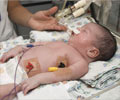A study in the U.S. has linked the increased number of birth defects in kids of women who got pregnant in spring or summer to elevated levels of pesticides in surface water across the country.
A study in the U.S. has linked the increased number of birth defects in kids of women who got pregnant in spring or summer to elevated levels of pesticides in surface water across the country.
Studying all 30.1 million births, which occurred in the U.S. between 1996 and 2002, the researchers found that women whose last menstrual period occurred in April, May, June or July were at increased risk for delivering infants with birth defects.They also found that this period of increased risk correlated with elevated levels of nitrates, atrazine and other pesticides in surface water across the country.
While many of these chemicals, including the herbicide atrazine which is banned in European countries but permitted in the U.S., are suspected to be harmful to the developing embryo, this is the first study to link their increased seasonal concentration in surface water with the peak in birth defects in infants conceived in the same months.
The correlation between the month of last menstrual period and higher rates of birth defects was statistically significant for half of the 22 categories of birth defects reported in a Centers for Disease Control database from 1996 to 2002 including spina bifida, cleft lip, clubfoot and Down's syndrome.
"Elevated concentrations of pesticides and other agrochemicals in surface water during April through July coincided with significantly higher risk of birth defects in live births conceived by women whose last menstrual period began in the same months," said Paul Winchester, M.D., Indiana University School of Medicine professor of clinical pediatrics, the first author of the study.
"While our study didn't prove a cause and effect link, the fact that birth defects and pesticides in surface water peak during the same four months makes us suspect that the two are related," he added.
Advertisement
Source-ANI
ARU/L














